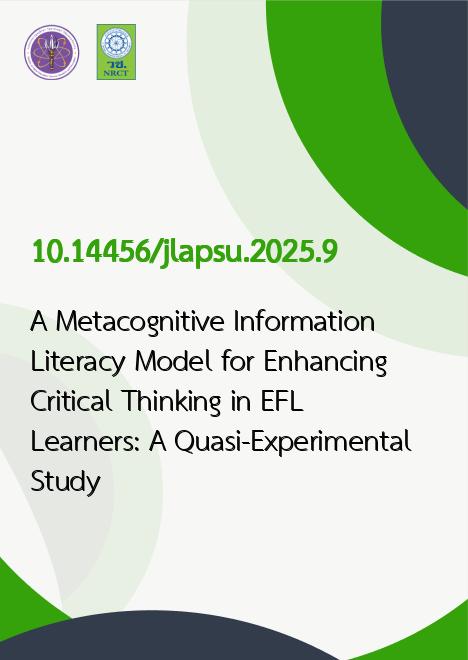
|
A Metacognitive Information Literacy Model for Enhancing Critical Thinking in EFL Learners: A Quasi-Experimental Study |
|---|---|
| รหัสดีโอไอ | |
| Creator | Chanida Phongnapharuk |
| Title | A Metacognitive Information Literacy Model for Enhancing Critical Thinking in EFL Learners: A Quasi-Experimental Study |
| Contributor | Piansin Pinchai |
| Publisher | Faculty of Liberal Arts, Prince of Songkla University |
| Publication Year | 2568 |
| Journal Title | Journal of Liberal Arts, Prince of Songkla University |
| Journal Vol. | 17 |
| Journal No. | 2 |
| Page no. | 284958, pp.1-25 |
| Keyword | Information Literacy, critical thinking, CRAAP Test, metacognitive strategies, formative assessment |
| URL Website | https://so03.tci-thaijo.org/index.php/journal-la/index |
| Website title | Journal of Liberal Arts, Prince of Songkla University |
| ISSN | 2651-1126 |
| Abstract | The objective of this study was to evaluate the effectiveness of a Metacognitive Information Literacy (MIL) model for enhancing learners’ critical thinking skills. Furthermore, the study assessed learners’ satisfaction with the model as it was incorporated into the learning experience. To this end, a one-group pretest–posttest design using purposive sampling was employed. Data was collected from 83 English-major undergraduates enrolled in the Digital Media Literacy course. Critical thinking assessments were conducted before and after the implementation of the MIL model. The test scores were calculated for mean, standard deviation, and p-value. Additionally, the satisfaction survey collected feedback about teaching instruction, student engagement, and collaborative activities through the ratings on a five-point scale. The findings indicate that the MIL model significantly enhances critical thinking as evidenced by the comparison of pre-test (M = 40.41, SD = 10.9) and the post-test (M = 52.77, SD = 8.73) scores statistically significant (p<.00). The survey results also reveal high levels of satisfaction with the model’s strategies for fostering a cooperative learning environment (M = 4.25), promoting metacognition (M = 4.41), and developing critical thinking abilities (M = 4.33). The result of this study suggests that the MIL model can be valuable, particularly for supporting learners as they develop their capacity to evaluate online sources, a necessary competency for university education and lifelong learning. |